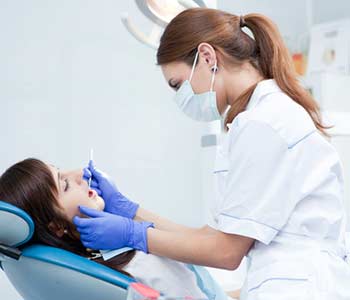Dentist in Wrentham helps you understand symptoms of Bruxism
At Advanced Dental Practices in Wrentham, MA, we offer dental services that help patients enjoy a healthier, more functional, and more attractive smile. If you have issues with tooth grinding or clenching, you may have a condition called bruxism. Our team is experienced in diagnosing bruxism based on a comprehensive examination and discussion of symptoms, and offering treatment options that really work.

What is bruxism?
Bruxism is the dental term for teeth grinding and clenching. It most frequently occurs when people are unaware of it, such as when they are sleeping or deep in concentration performing specific tasks. Bruxism can occur anytime – whether or not the patient is aware of the issue. It can also happen to people of all ages, adults and children alike. In fact, bruxism is a very common condition. While it can cause dental issues and other problems if left untreated, it is very easy to treat.
What causes bruxism?
The number one cause of bruxism is stress or anxiety. Oftentimes, individuals will notice their bruxism initially, but over time the condition becomes a habit and the person is unaware they are even doing it. Once the grinding becomes an unconscious habit, it can be a very difficult one to break.
Other factors that may increase the risk of bruxism include:
- Medications or other substances – Certain antidepressants or recreational drugs can increase the risk of bruxism. Other substances such as tobacco, alcohol, and caffeine may also increase the risk
- Genetics – Bruxism that occurs while sleeping can be related to family history
- Medical conditions – There has been a link of bruxism to certain medical conditions such as Parkinson’s, gastroesophageal reflux disease (GERD), dementia, epilepsy, attention-deficit/hyperactivity disorder (ADHD), and sleep apnea
Signs and symptoms of bruxism
- Grinding or clenching teeth
- Teeth that are worn down
- Cracked/chipped teeth
- Tooth sensitivity
- Jaw pain
- Chronic headaches
- Persistent earaches
- Broken restorations
- Facial soreness
- Sleep interruption
How we diagnose bruxism
During regular dental checkups, we always look for signs of bruxism. If we begin to notice specific changes that may be related to grinding and clenching, we will evaluate you to determine the cause. In addition to a physical examination, the dentist will ask questions about daily routines, sleep, stress levels, overall health, and medications in order to make an accurate diagnosis. X-rays may be taken to assess any damage to the teeth or bones as a result of bruxism.
Treating bruxism

When it’s suspected that bruxism may be related to sleep issues, we may refer patients to a sleep specialist to determine if there any disorders such as sleep apnea that are present. Those with anxiety-related bruxism may be referred to a therapist for help with the condition. Many children who have issues with grinding and clenching eventually go on to “outgrow” the condition.
When the problem is severe, we may recommend oral appliance therapy using a dental mouthguard. A professionally-made dental mouthguard is a comfortable, custom-fitted oral appliance that can be worn during sleep to prevent teeth grinding. The appliance acts as a barrier between the upper and lower arches of teeth to ensure that the tendency to grind does not harm the teeth. This appliance is also effective at reducing muscle tension, which can relieve jaw pain and headaches.
Caring for your oral appliance is straightforward, but good care is important to ensure the longevity of the mouthguard. Always make sure to keep them clean. We recommend brushing the appliance when you brush your teeth. This ensures that there aren’t trapped bacteria in the mouthguard that can contribute to tooth decay. Store the mouth guard in a denture solution to keep it soft for a proper fit. If you have pets or young children, make sure to keep the mouthguard in a safe place, out of reach.
Are you ready to find an easy, affordable solution to your bruxism? You don’t have to live with symptoms such as constant headaches or jaw pain as a result of teeth grinding and clenching. In fact, in addition to relieving symptoms, mouthguards can also prevent potentially costly restorations that may be necessary as teeth become worn or broken.
If you are in the Wrentham, MA and would like to find out if bruxism is the cause of your symptoms, call Advanced Dental Practices today at (508) 456-7111 to schedule an appointment.














